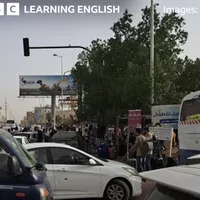Sudan: Thousands in danger — BBC News Review | by 700 Eth | Apr, 2023 | Medium
Sudan Crisis. Thousands try to leave the capital, Khartoum. This is News Review from BBC Learning English. I'm Neil. And I'm Beth. Make sure you watch to the end to learn vocabulary to talk about this story. Don't forget to subscribe to our channel, like this video and try the quiz on our website.
Now, the story. Humanitarian crisis in Sudan as thousands try to leave. Fighting broke out on the 15th of April because of disagreements between the country's military leadership. About five hundred civilians have been killed so far in the capital, Khartoum, according to the UN. A 72-hour ceasefire was agreed from Monday.
You've been looking at the headlines, Beth. What's the vocabulary? We have: worst-case scenarios, accelerates and window. This is News Review from BBC Learning English. Let's have our first headline. This is from The Guardian. ‘The worst of worst case scenarios': western diplomats blindsided over Sudan Crisis.
So, the headline says that diplomats have been blindsided by this crisis. It means it was a big surprise. We're looking at ‘worst-case scenario'. Now, I'm sure we all know ‘worst', but ‘worst-case scenario' — what does it mean? Well, ‘worst-case scenario' describes a situation, or scenario, which is the worst possibility, the worst case in that situation.
So, of all the bad outcomes that could have happened, this was the worst. It's as bad as it could get. OK. So, in the headline, ‘worst case scenario' is a quote. The person who said it was a UN representative, an important position, but can we use this in our everyday English? Yeah, we can and it's often used when we talk about future possible situations or outcomes.
So, you imagine the possible outcomes and this is the worst of those options. Yeah. So, imagine you're hiking in the mountains. The weather gets bad. You get lost. The worst case scenario is that you could actually die. But, it doesn't have to be life or death situations. Imagine that your car breaks down. The worst possible scenario is that you have to buy a new car.
We should mention that there is also the opposite, the ‘best-case scenario'. And in that situation, the best-case scenario is you just need a minor fix for your car. Let's look at that again. Let's look at our next headline. This is from the enquirer.net. UN warns of ‘catastrophic conflagration' in Sudan as foreign exodus accelerates.
So, lots of interesting words in this headline. ‘conflagration' is a violent event. ‘exodus' is when lots of people try to leave somewhere. But, we are looking at the verb ‘accelerate' and it might be useful to think about cars again. Yeah, it might be.
So, we use ‘accelerate' for a car when it speeds up — you press the accelerator. Now, in the headline, it says that a ‘foreign exodus accelerates'. So, it means that lots of people are leaving more quickly than before. And you used the phrasal verb ‘speed up' there, which also means ‘accelerate'. We can also say ‘quicken' to mean the same thing.
We can, and we can use ‘accelerate' in lots of different situations. So, runners in a race might accelerate when they see the finish line. And diseases can accelerate. In 2020, Covid infection rates accelerated around the globe. Let's look at that again. Let's have our next headline. This is from Sky News.
Ceasefire under way in Sudan as UK government warned not to miss window for evacuations. So, this headline describes the UK government warning people to evacuate Sudan. That means get out quickly, and not miss the window. Now, when we say ‘window', we probably think of that space in a wall, usually covered by glass. Yeah. And it definitely helps to think about that.
So, literally a window is a space. But here, we're talking about a window of opportunity. This is a metaphorical space for an opportunity, or a limited time when there's a chance to do something. Yeah. So, window is used in the headline to mean that people have a small, or limited amount of time to leave Khartoum, or Sudan, altogether.
That's right. And we can also use ‘window' like this when organising time. So, in business, for example, maybe you need an urgent meeting, but it has to happen today. So, there's only a small window of time or opportunity. Yes or perhaps you are applying for a job and you need to do it quickly before the window closes and it's too late to apply.
Let's look at that again. We've had: worst-case scenarios — worst possible situations, accelerates — speeds up and window — a limited period of time. And if you like learning vocabulary from the news then click here for a playlist of our previous News Review stories. And click here to subscribe to our channel so you never miss another video.
Thanks for joining us. Bye! Goodbye.

